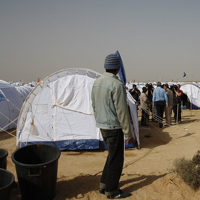When do humanitarian crises resulting from internal conflicts merit international military intervention? Despite the formal international consensus endorsing an international "responsibility to protect," there is very little agreement on when armed intervention in another state's internal conflicts is justified and appropriate. Even among Western nations, where support for this concept is strongest, there is no general agreement as to what ought to trigger international intervention. The ongoing U.S. and NATO military intervention against the Libyan government has become the first test case for the responsibility to protect (R2P) doctrine since U.N. member states approved it in 2005. However, the manner in which the doctrine was used to authorize and carry out collective action against Moammar Gadhafi's regime has undermined the integrity and credibility of the doctrine in the future.
There are occasions when a government has so thoroughly failed in its duties to protect its population, whether by systematically attacking part or most of the population or through being incapable of exercising sovereignty over its own territory, that the task of providing security and ensuring regional peace and stability will fall to other governments acting under the authority of the United Nations. However, in order for the responsibility to protect to become a credible, reliable instrument of international law, rather than a pretext to take military action against isolated or weak governments, it has to be used scrupulously for its intended purpose in response to genuine cases where a large-scale loss of life is taking place or is very likely to take place. State sovereignty is not absolute, but it is a vitally important protection against interference in the internal affairs of other states, usually smaller and weaker ones, and one that must be compromised only in truly exceptional cases.
As the foremost military power in the world and as a permanent member of the U.N. Security Council, the United States will be expected to have some role in almost all of these interventions, so it is also important to consider the conditions that would merit specifically American involvement. Since the end of the Cold War, there have been almost no humanitarian military interventions that have not been facilitated politically and militarily by the U.S., and it is doubtful whether many other states or combinations of states would have the willingness and capability to intervene without U.S. diplomatic and military support. Even in Libya, where the U.S. role is smaller than it has been in previous cases, there would have been no intervention had the Obama administration not abruptly changed its position to favor military action. So when we are debating the merits of humanitarian intervention, we are inevitably also debating the wisdom of U.S. involvement in a new foreign war.

